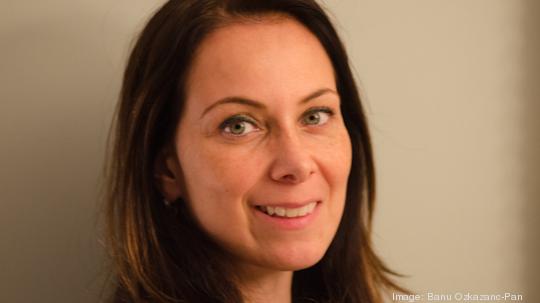
As founder and director of the Venture Capital Inclusion Lab at Brown University, Banu Ozkazanc-Pan is knee-deep in the minutiae of how innovation economies work — and the ways in which they often fail entrepreneurs from underrepresented backgrounds.
Ozkazanc-Pan's research focuses on how and why venture capital flows mainly to white men to the exclusion of founders from other groups. She has spent years exploring various drivers of bias, whether intentional or unintentional (so-called "unconscious bias"), as well as how they can be mitigated. In the last year, Ozkazanc-Pan has teamed up with The Capital Network on a series of virtual conversations focused on investment and inclusion, as well as with Atlanta-based Zane Venture Fund on a new program to support student founders.
"If we had more diverse founders, what other uses and products and services could be coming to market that really impact our lives?" Ozkazanc-Pan said. "A small number of startups can have a large impact on our lives and our behaviors. It matters who gets to participate in creating a future."
Rhode Island Inno caught up with Ozkazanc-Pan to talk about her work at the Venture Capital Inclusion Lab, what actions are needed to foster diversity and inclusion in the startup world and — importantly — what gives her hope.
This conversation has been edited for length and clarity.
Tell me about the Venture Capital Inclusion Lab, how you got started and what your mission is today.
I started the venture capital inclusion lab at the Nelson Center for Entrepreneurship at Brown University, using some funding from a grant that I received from the Kauffman Foundation with a colleague. I used the funding to explore the ways in which venture capital flows to certain people and communities and not to others. It was really a research focus that we've been wanting to explore: why we continue to see the dynamics that we do in the venture capital industry in terms of women and minorities being really missing, as venture-backed founders, but also as investors who are looking at supply and demand issues. That research continues.
I have spent plenty of time interviewing VCs who identify as women or minorities but also those who identify as white and are interested in changing the dynamics of the industry and creating more opportunities for venture capital flow to communities and founders who have not traditionally benefited.
Another area in which I'm doing some work is looking at individual drivers of bias, firm drivers and industry-level drivers, because it's really not just one thing. It's these three elements working in tandem. When I hear people say we're doing unconscious bias training, that's wonderful, but it's an individual-level fix for a systemic problem. While it may be a little bit of a help in the right direction, it simply is not enough to solve the systemic ways in which the industry functions.
What do you find are some of the key drivers of bias?
Some of it is quite honestly unintentional networking practices where the circulation of people ideas and capital is among a close knit community of people who know and trust each other based on affiliation, former experience working together, educational background. In many cases, homophily or just being similar across demographic features. That's not done to intentionally keep people out. It's done because they believe that is how they can ensure trust and do great due diligence and create deal flow, but the consequence of that kind of behavior is that it leaves a large number of people out of networks.
Absolutely. I read something recently along the lines of, white young male founders get funding, and they're allowed to spend it as they make mistakes and go along, whereas minority founders and women get mentorship, because venture capitalists are not wanting to take the risk. They want to make sure that they're set up, for whatever reason, before actually writing the check.
Yeah, there's a lot of sort of unspoken assumptions about who we can trust with our and other people's money. It comes across in nuanced ways where you'll ask people, "Do you value diversity, equity, inclusion?" "Of course." But then you ask them, "Are you willing to invest in a first time founder? Are you willing to invest in an emerging fund manager? How much money are you willing to put aside for particular types of founders?" And you'll see quickly, when you ask them these very concrete, discrete actions, a lot of times, they'll answer no to each of them. Even though they abstractly value diversity, equity and inclusion, their actions don't match that because their actions are based on what they think has worked for them, and anything beyond that is seen as too risky — which is a paradox for an industry that strives to find the best equilibrium between risk and reward.
We were talking a little bit earlier about this idea that Rhode Island's innovation ecosystem in particular is really nascent. There's not a whole lot of venture capital firms here, a lot of the founders are really young, the companies are really young, which in some senses provides an opportunity to get things right when it comes to diversity, equity and inclusion, rather than trying to fix it later. What do you think are some of the opportunities here? What should people be keeping in mind?
It's a really astute observation, and if we were to put Rhode Island in a typology of ecosystem identities, it would be an emergent. There's not a lot of established norms, rules and institutions, and there's not a lot of resources to support entrepreneurship. They're all emergent. The intermediary organizations that support entrepreneurs and entrepreneurship have a real opportunity to do diversity, equity and inclusion not as a month-long event, but every single thing that they do without necessarily calling attention to it — making sure that all the events have that presentation and perspective from a diversity of ecosystem players, rather than sort of call attention to the fact that "we're going to speak to diverse founders today."
The other issue would be to really look at those organizations that are supporting entrepreneurship, or finding solutions to existing challenges and start partnering with them. There are a lot of community organizations that are working with communities who generally are outside the boundaries of the hub that's taking shape, like the CIC [Providence].
It's about expanding the geography of entrepreneurship, not to say, "When we think of entrepreneurship, we think about this one location."
Do you think that the pandemic will potentially accelerate that as we turn to more remote work of remote networking?
I am seeing some real positives in terms of people being able to access people. People are opening up networks, opening up opportunities to connect. I'm actually writing another book. It's looking at ecosystems through a transnational lens for Cambridge University, and I'm using the Cambridge Innovation Center as a model for an organization that exists across the world. The pandemic has enabled people who, for example, don't live in Tokyo to Zoom into the events that are taking place there and connect to people who might be doing similar work. Similar startups will have similar challenges in a different context, and learn from each other. I think that there's a real powerful opportunity to keep remote access available in a manner that allows people to participate.
Do you think that that will continue to be a trend, even in a post-vaccine world, once we've achieved herd immunity or whatever the marker is?
It's a great question. I am hoping it is, because it has created additional opportunities for access. My fear is that it was a fix, rather than a way for people to continue engaging.
Some organizations have talked about turning to a hybrid model in the future where if you're having a panel discussion, then that can be live and you can have in-person attendees, but you can also livestream it and have opportunities for networking over email or on some kind of platform like RIHub.
Absolutely. There's really no reason to not have those opportunities built in, because that's what it creates: new opportunities and new structures for connecting by dismantling existing ways of networking. That's exactly the problem that we're facing. Existing networks are quite insular, and maybe this is one way in which we can open those up and create more opportunity and access. Ultimately, structures need to change, and we produce technology as a tool in that regard.
I mean, technology is always supposed to be a tool. It's not supposed to be the endgame solution.
Exactly. This is why it's always fascinating when I think about venture-backed founders and their use of technology. If we had more diverse founders, what other uses and products and services could be coming to market that really impact our lives? It's not just about funding the best and the brightest, because we are limited in who and what we're funding. A small number of startups can have a large impact on our lives and our behaviors. It matters who gets to participate in creating a future.
Well, and the other thing about startups and high-tech companies is that the reason why people invest in them is because they scale so well. So you really do only need a couple of people in order to have a big impact and make a lot of money. I wonder how that factors into your equity research.
What's interesting is that scaling and growing doesn't always translate to hiring people. While it might be beneficial for return on investment, we also have to look at, does that scaling and growing actually benefit the economy? Does it create jobs? That's not true in most cases.
Is that a place that provides opportunity for change? My understanding from years of reporting on and being involved in the tech industry is that people want to have a small number of employees. They want to be able to scale that way.
Yeah. It's the lean startup model. The flip side is the creation of jobs is not the same level as we saw in previous decades, when companies would grow and hire so many people. On the one hand, O.K., you're lean, but on the other, how many and what kinds of jobs have you created?
If you think about it, the idea of a startup is it's tiny, it's lean, it moves fast. When it scales, what kind of jobs does it create? Amazon has a ton of remote workers who are not full time. Number-wise, it looks large, but when you look at full-time status and benefit, you're trying to understand some of the growing wealth inequalities in this country. What is the role that tech companies play? If a tech company moves in, real estate prices go up — there are a lot of problems that go along with tech.
I know that a lot of your work is really focused on changing these structures. A lot of these problems are really foundational. If you could give business leaders, and perhaps policy leaders as well, a handful of takeaways, what would you focus on?
I would say think about what it means to do innovation for all. We're looking for innovation that's going to be scaled rather than innovation for good. Our models rely on these closed networks for assessing who can be trusted, who's worthy of risk. I think we need to reassess the ways in which the system creates and rewards massive failures — and then the individuals involved can essentially continue within the system.
The model for intermediary organizations who support entrepreneurs will need to think about, where do you put in the equity, especially for equity accelerators? Do you do it in the beginning so that you can have more opportunities for founders from various backgrounds to succeed, or do you do it at the end, when it's harder for people who come from a background of not as much wealth and privilege to do something full time? The model for supporting founders might need to change in some of these really big-name accelerators that require a particular amount of privilege to start with.
Aside from the CIC, are there organizations or businesses that you think are models?
MassChallenge operates globally as an accelerator, and they have Israel and Mexico, and a couple of other locations.
And Rhode Island.
Exactly. That's a good model to think about on a global scale. There's a national model, Venture For America, that allows people from different colleges a two-year paid fellowship at various different startups across the U.S., predominantly in cities that are majority-minority. That allows young people to become exposed to ecosystems, to think about ways they can be entrepreneurial and/or engaged in startups. There is Rise of the Rest, which is really looking at rural entrepreneurship and the ways innovation takes place there and how that also needs to be supported. We tend to focus on VC, which tends to mean big cities, but there's a lot of innovation happening in different geographies.Thinking about the ways that we could create funds, loans, grants for those kinds of innovators will be really important.
I would love to know: What are a couple of things that give you hope, working in this area?
I'm feeling hope when I talk to emerging fund managers and when I also talk to predominantly white investors who truly want to do something different. There is some movement there in terms of understanding both the system and new ways in which we could think about funding, whether that is working to create access to networks for people who didn't have access.
With The Capital Network, we're looking at action steps, and one is really thinking about how we network, including partnering with organizations whose networks are not the same as ours. Committing to writing checks, having an actual commitment to writing a particular amount of checks, so that you are held accountable to yourself and to your partners Supporting founders — even earlier on, way before they're fundable — to create a pipeline. In many ways, it's hard to compete for all the different kinds of founders that are out there right now.
I think especially in cities that have emerging ecosystems, it's really important for cities to take interest in the innovation economy and create opportunity and use their power to convene leaders from diverse groups, and to create a hub of activity that is going to be sustainable in the long run. The innovation economy is really important. What's even more important is that it's an innovation economy by everyone, for everyone, rather than only certain communities. That would create a really robust model for an innovation economy that's inclusive.





